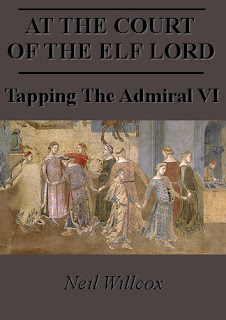Liner Notes for At The Court Of The Elf Lord
Liner Notes for my Age-of-Sail Fantasy story At The Court of the Elf Lord, the sixth in the series of Tapping The Admiral.
Liner Notes 6
This is probably the most self-indulgent story in the series. But I’m not going to apologise because it does exactly what it is supposed to. We have what is essentially a Renaissance Allegorical Court Procession, with elves taking on the personas of various attributes. The masques and plays that had (for example) Chastity and Pride on stage doing things are out of fashion, so help to get across a touch of the alien elf society. Yet it’s not so weird as all that, allegorical figures in painting are familiar to us, and I give Fanshawe a guide to, if not exactly explain everything that is going on, at least give names for it.
Will Fanshawe, like Robin Button in the previous story, has left the navy at the end of the war, and like him signed on again in much the same role on a civilian ship. Again disaster strikes, though here it propels Fanshawe up the ladder of promotion. Here he is negotiating trading rights with a sovereign nation. How far he has come.
Speaking of Robin Button it seems that joining up with the Cat Step Walker has paid off for him. He’s fallen on his feet, gaining a valuable concession in Elfport at the very time when a merchant of his acquaintance can make use of it.
The Elven Extants I’ve placed in the place on the globe occupied by the Kerguelen Islands in our world, and having done that decided to use a map of those islands as the basis for the map I posted last week. I’m not sure it’s a success; I think I’ll stick to just making them up in future.
Anyway dragons. They’re just mythical, right? And Elves, long-lived to be sure, but immortal? This is nonsense. More so the suggestion that elves sailed the seas of the world three thousand years ago, spreading knowledge of bronze-working. Certainly the idea that iron was developed in response, to try and break their stranglehold on trade and seafaring is an attempt to explain children’s myths. This is an age of science and rationality; we shall ignore such fairy-tales.
Liner Notes 6
This is probably the most self-indulgent story in the series. But I’m not going to apologise because it does exactly what it is supposed to. We have what is essentially a Renaissance Allegorical Court Procession, with elves taking on the personas of various attributes. The masques and plays that had (for example) Chastity and Pride on stage doing things are out of fashion, so help to get across a touch of the alien elf society. Yet it’s not so weird as all that, allegorical figures in painting are familiar to us, and I give Fanshawe a guide to, if not exactly explain everything that is going on, at least give names for it.
Will Fanshawe, like Robin Button in the previous story, has left the navy at the end of the war, and like him signed on again in much the same role on a civilian ship. Again disaster strikes, though here it propels Fanshawe up the ladder of promotion. Here he is negotiating trading rights with a sovereign nation. How far he has come.
Speaking of Robin Button it seems that joining up with the Cat Step Walker has paid off for him. He’s fallen on his feet, gaining a valuable concession in Elfport at the very time when a merchant of his acquaintance can make use of it.
The Elven Extants I’ve placed in the place on the globe occupied by the Kerguelen Islands in our world, and having done that decided to use a map of those islands as the basis for the map I posted last week. I’m not sure it’s a success; I think I’ll stick to just making them up in future.
Anyway dragons. They’re just mythical, right? And Elves, long-lived to be sure, but immortal? This is nonsense. More so the suggestion that elves sailed the seas of the world three thousand years ago, spreading knowledge of bronze-working. Certainly the idea that iron was developed in response, to try and break their stranglehold on trade and seafaring is an attempt to explain children’s myths. This is an age of science and rationality; we shall ignore such fairy-tales.


Comments